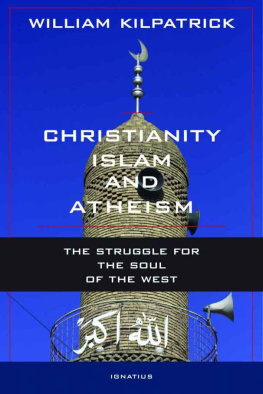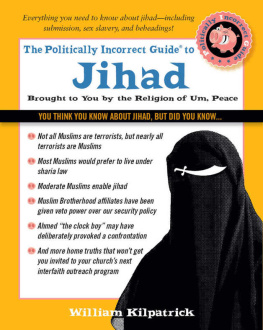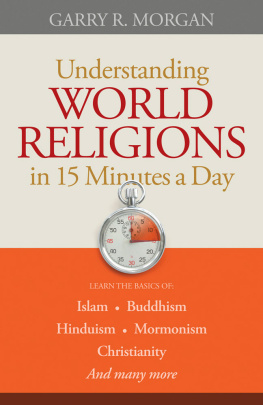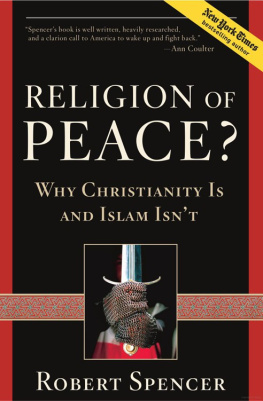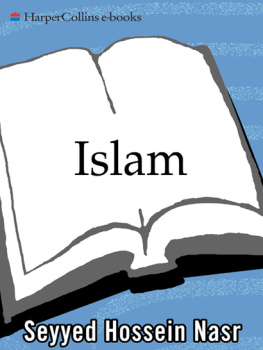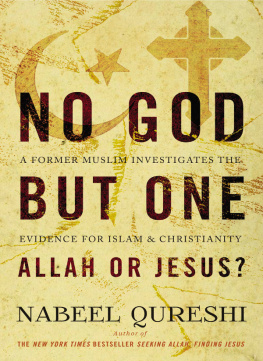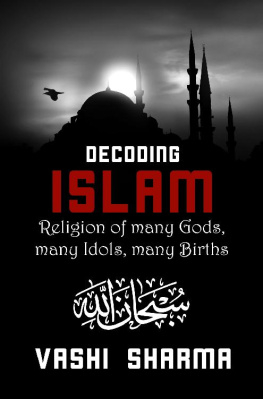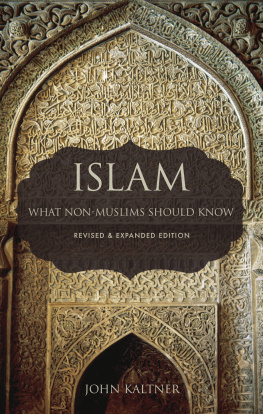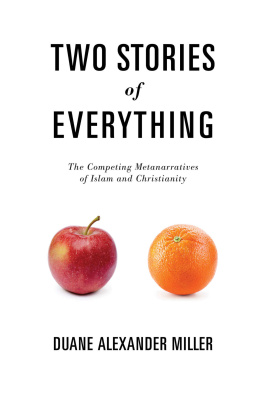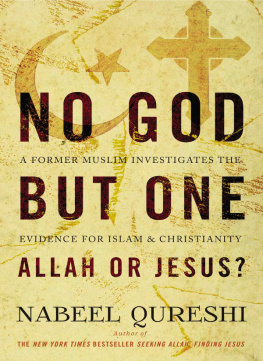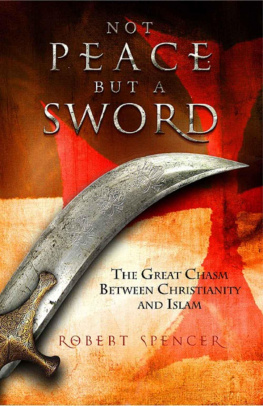CHRISTIANITY, ISLAM, AND ATHEISM
William Kilpatrick
CHRISTIANITY,
ISLAM,
AND ATHEISM
The Struggle for the Soul of the West
IGNATIUS PRESS SAN FRANCISCO
Except where noted, all quotes from the Koran are from
the translation by N.J. Dawood
published in 2000 by Penguin Books, London
2000 by N.J. Dawood
Used with permission
Unless otherwise noted, Scripture quotations (except those within citations) have been taken from the Revised Standard Version of the Holy Bible, Second Catholic Edition, 2006. The Revised Standard Version of the Holy Bible: the Old Testament, 1952, 2006; the Apocrypha, 1957, 2006; the New Testament, 1946, 2006; the Catholic Edition of the Old Testament, incorporating the Apocrypha, 1966, 2006, the Catholic Edition of the New Testament, 1965, 2006 by the Division of Christian Education of the National Council of the Churches of Christ in the United States of America.
All rights reserved
Cover photograph:
God is Great on minaret, Kurdistan, Iraq
iStockphoto
Cover design by Roxanne Mei Lum
Published 2012 by Ignatius Press, San Francisco
2012 by William Kilpatrick
All rights reserved
ISBN 978-1-58617-696-9
Library of Congress Control Number 2012936911
Printed in the United States of America
CONTENTS
INTRODUCTION
Christians in the Muslim world face daily persecution. In some places they are threatened with extinction. Will Christians in Europe and America someday find themselves in the same precarious position that Christians in Egypt, Pakistan, and Iraq now occupy? That will depend on whether they wake up and defend their freedom while they still can.
Muslim persecution of Christians has increased dramatically in recent years. One of the main reasons for this is that, in failing to understand Islam, Western countries have helped to unleash the antagonism toward non-Muslims that lies at the heart of the Islamic faith. For the better part of the twentieth century, secular, despotic governments in the Middle East and in other Muslim regions acted as a restraining force on the more violent manifestations of Islam. Then, starting with the ouster of the shah of Iran in 1979, the situation began to change. Secular strongmen were pushed aside or eliminated, and traditional Islam was able to reassert itself. Western nations played a large part in this transformation. They encouraged, supported, and sometimes actively participated in the overthrow of autocratic rulers with the naive confidence that democracy would usher in an Arab Spring, that is, a blossoming of human rights and liberties. But the overthrow of the shah in Iran, of Hussein in Iraq, of Mubarak in Egypt, and of Gadhafi in Libya didnt have the expected resultneither did free elections in Gaza, Lebanon, and Turkey. Many Muslims in the Middle East, North Africa, and parts of Asia have become more radicalized and more dangerous, with the result that the future of the non-Muslim population in those areas hangs by a thread. Christians in many predominately Muslim regions now live in a nightmare world of beatings, abductions, rape, imprisonment, torture, looting of shops, and burning of churches.
My people are destroyed for lack of knowledge, said the prophet Hosea (Hos 4:6). Western lack of knowledge about Islam is not the only reason Christians in the East are being destroyed, but it is a contributing factor. A basic knowledge of Islam would include the fact that it requires the ultimate subjugation of other religions. Moreover, even a cursory glance at Islams founding document, the Koran, reveals a pronounced disdain for non-Muslims. One of the main reasons for Western ignorance of these facts is that they conflict with one of the most cherished of contemporary Western beliefs: the belief in the benefits of cultural diversity. Paradoxically, this belief rests on a deeper conviction that differences between peoples are in reality only surface phenomenathat although cultures and religions appear to be diverse, they are actually very much the same. Although Islam appears to be different, it must, according to this view, be just like other religions. What appear to be differences are only misunderstandings, and facts that dont support this claim are routinely ignored or suppressed. For this reason, most of the atrocities committed against Christians by Muslims receive very little media attention. When the facts cant be ignored, they are often misrepresented. Thus, attacks on Christians by Muslims are described by the media as sectarian strife or as clashes between Christians and Muslims.
A carefully guarded ignorance about Islam is widespread in the Western world, and if Western citizens choose to remain in the dark, the problems faced by Christians in Muslim lands could soon become our problems. Europe is already well along the road to Islamization, due in part to immigration and high Muslim birthrates, but also due to strictly enforced speech rules. In several European countries, telling the truth about Islam is a crime. Although further behind, America is on the same road as Europe. The extent of Islamic penetration of our institutions is far greater than most Americans realize, but the mainstream media, along with courts, universities, and various politicians, have been quite willing to obscure this reality.
In some cases this suppression of the facts is conscious and deliberate, but in many cases its the result of garden-variety group think. Journalists, for example, tend to come from similar backgrounds and attend the same schools of journalism. They belong to a circle of like-minded people among whom certain thoughts are automatically affirmed, while others are automatically excluded. Many of the information gatekeepers sincerely believe the propaganda generated by Islamic apologists because it fits comfortably into their pre-existing thought world. When it comes to covering Islam, they are club reporters, not cub reporters. As Rifqa Bary said to a group of reporters covering her story, You guys dont understand. She might more accurately have said, You wont understand.
Who is Rifqa Bary? That her story received only grudging coverage might serve as an illustration of how effectively negative information about Islam is controlled. Bary, a Muslim girl living with her parents in Ohio, had secretly converted to Christianity at the age of fifteen. When her parents discovered the truth two years later, Bary, fearing for her life, fled to Florida, to the home of a Christian pastor and his wife with whom she had been in communication. A court battle ensued and eventually resulted in her return to Ohio, but not to her parents. Rather, she was put under the protection of Ohio social services until she reached eighteen, the age of legal emancipation.
Much of the court battle revolved around the question of whether Bary was in any danger from her parents. Her defense argued that Islamic law requires the death penalty for apostates and that her parents would be expected to carry out the execution in order to cleanse their honor. This is what Bary tearfully told Florida reporters:
I dont know if you know about honor killing.... You guys dont understand. Islam is very different than you guys think. They have to kill me. My blood is now halal , which means that because I am now a Christian, Im from a Muslim background, its an honor. If they love God more than me, they have to do this. And Im fighting for my life, you guys dont understand. You dont understand.
Most of the media coverage, however, suggested that Bary was the one who had misunderstood her religion, that what she asserted couldnt possibly be the case. Her claim flew in the face of the established narrative that Islam was a religion of peace and justice. The murder of apostates simply didnt fit into the narrative.
If the reporters covering the case had done their homework, they would have discovered that there is an almost universal consensus among Muslim scholars that male apostates must be killed, although many Muslim authorities hold that female apostates need only be imprisoned until they repent and reconvert. Bary was aware of the lesser punishment, but she also knew that Islamic law allows Muslim men to take matters into their own hands when it comes to their wayward daughters. Either they do that [kill me], she said, or they send me back to Sri Lanka. There is an asylum there where they put people like me.
Next page
